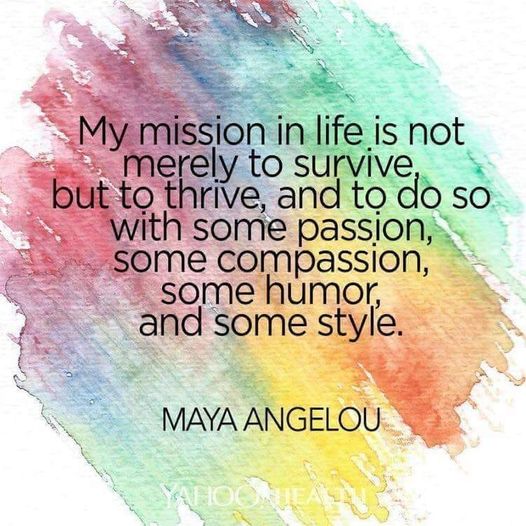0. Be Prepared.
Whether it is a trucking or petrol strike, a riot or other civil unrest, a local, national or global food shortage, a solar eruption that wipes out the electricity grid, a cyclone, hurricane or tsunami or earthquake, there are any number of reasons you should not be caught without being prepared. As one site says. “The future belongs to those who prepare.”
While you can, go onto Google and research a bugout bag then gather the components you have selected and pack one.
Here is a starter list.
Clothes
Underwear appropriate to your climate and season
A pair of sturdy shoes or boots
2 pairs of socks
Long, strong pants
2 shirts, one short and one long sleeved
Warm, waterproof jacket
Hat
Bandana
Hankerchief
Rain covering
Spare specatacles
Water
1 litre per person per day
Means to purify collected water (coffee filters, colloidal silver or iodine drops or iodine tablets)
Food
At least enough MREs (Meals Ready to Eat) for 3-7 days
Comfort food
Pet food if you are taking them
Shelter
A tent or two 3m x 3m tarps, one for over and one under, to stay dry
Sleeping bag or pad and blankets
First Aid Kit
Bandaids
Bandages of various sizes
Gauze
Sticking plaster
Scissors
Dropper
Cotton balls
Instruction booklet
Honey (antibacterial, antimicrobial, throat soother)
Petroleum jelly
Imodium (for diarrhea)
Aspirin or Panadol
Tweezers
Safety pins
Hip flask of alcohol for anesthetic or antiseptic
Heat
Have 3 ways to start a fire. Here’s 4:
Waterproof matches
lighter
9 volt battery and fine steel wool
FireSteel and scraper
Cooking
Minimally a large cup or small pot to boil water, ideally a camp or scout stove
Pot scraper/cleaner
Spoon, knife and fork
Plate
Bowl
Light
At least 2 flashlights and backup batteries
Ideally a light with a hand crank so it can be recharged
Candles
Tools
Survival knife
Leatherman Multitool or Swiss army knife
Good scissors
Sewing kit
Gem saftey razors
Weapon
Hand gun or rifle
Ammunition
Toiletries
Soap
Shampoo
Tooth brush
Tooth paste
Washer
Toilet paper
Towel
Cotton buds
Sunscreen
Toothpicks
Dental floss
Miscellaneous
Cash
ID (License, passport)
Medical records
Sturdy duffle bag or back pack large enough to hold contents of bug out bag
Paper
Pencils
Fishing line
Ziplock bags
WD-40
Plastic garbage bags
Packs of normal cards
Pack of Canasta cards
Other games
AM/FM Radio
Mobile phone
2 way and or short wave radio
Make a diary note to check the kit each 3 months to make sure it is present, accessible and the components are operational and unspoiled by storage. Do not store the batteries in the torches or radio as they can corrode the terminals. Swap out the batteries each time you check your kit.
Formulate an emergency preparedness plan with your family and friends so that each knows what to do in the event of an emergency. Once a year, drill it. This should include a local and remote rendezvous point.
Improve your communication skills. It is better to talk than fight your way out of a fight.
Do a first aid course. They are cheap and held frequently.
If you are able to and of a mind to do so, procure and learn how to handle weapons.
Learn a marshal art.
1. Be aware.
Be informed of the truth and lies, learn who are the players and who are the pieces in the game of life as it is being played on the crazy planet. Be aware that most people are broken pieces, not up to being a piece or a player.
Be aware of the game plan of your opponent, their strategic plan and their tactics as well as the mechanisms by which the players and pieces operate.
Do not spend all your time doing the above. Do it only to a point that you know the scene then spend a minimal amount of time each week keeping abreast ofthe current scene so you are “in the loop” but not so much it is all encompassing or enturbulating (upsetting) you. Remember, the bad guys have power only to enturbulate. That is their game, to enturbulate. Don’t play their game. Do not allow yourself the luxury of becoming enturbulated.
2. Spread the word.
Inform others who are awake so they too are aware of the above. If this is your calling and you can afford to do so, by all means make this your full time activity. Otherwise restrict your time involvement so you can play your main game.
3. Pick your game.
Decide what game you will play that is pro survival for you, your family, your groups and society and the other life forms and the environment. It should be something about which you are passionate. If you don’t know what it is and cannot easily figure it out, contact me. If I am no longer around, look around for someone else who is playing a pro-survival game to which you could enthusiastically contribute your time and energy and help them play their game better.
4. Identify your allies and opponents.
Find out who is a potential ally – who playing the same game you have picked to play. Connect with them and see how you could leverage each other’s assets.
Discover who are your apparent and underlying opponents. Identify non-aligned parties who could be swayed either way and find out what they are wanting to accomplish.
5. Do everything feasible to not play the game of your opponent.
Once you know who they are, identify their game plan, formulate your own and decide what you can do to not participate in their game. Determine your own course of action. Opt out of the group think. If “everyone is doing it”, investigate doing the opposite.
6. Play hard to win.
Once you have identified the opponent, understand their game plan, have your own game and once you are no longer supporting or playing your opponent’s game, put the pedal to the metal on your game!
Wheat berries
buckwheat
rye
barley
oat groats
millet
sesame
brown rice
flax
corn
alfalfa
lentils
mung beans
almonds









